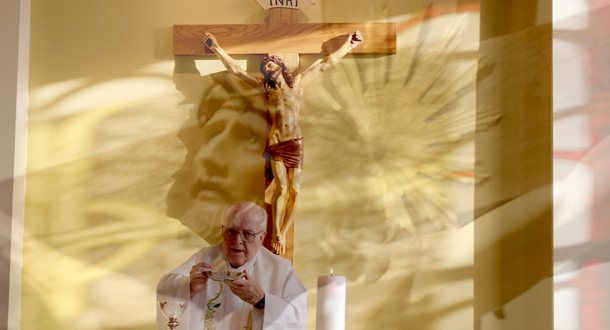
Scripture:
Reflection:
The Old Testament selection for this Saturday’s liturgy is from Genesis 18:1-15, one of the most powerful and intriguing stories in all the Bible. Abraham and Sarah, the great Patriarch and Matriarch of Israel, are camped at Mamre, a settlement near present day Hebron. Sitting in the entrance to his tent on a hot day, Abraham sees three men approaching and, in the tradition of desert hospitality, invites them to join him, offering to have their feet washed and take some rest, while a meal is prepared for them. Right from the start, Abraham seems to sense that these are not the usual kind of travelers but mysteriously represent the divine presence.
He urges his wife Sarah to prepare a fine meal of meat and bread and milk and serves it to his visitors while they enjoy the shade of the great Terebinth tree next to his tent. When they have finished their meal, one of the visitors astounds Abraham by promising that when the visitors return next year at this time, Sarah will have given birth to a son! The biblical narrator reminds us that both Abraham and Sarah were very old–so old that Sarah, listening to this conversation behind the tent flap, laughs out loud: “Now that I am so withered and my husband is so old, am I still to have sexual pleasure?”
A scene very similar to this had taken place in the preceding chapter of Genesis, but this time it was Abraham who laughed, burying his face in the crook of his elbow and laughing when God promised him that he would bear a child with Sarah: “Can a child be born to a man who is a hundred years old? Can Sarah, who is ninety years old, bear a child?“ (Gen 17:17). In each case the prospect of new life in such old bodies seemed preposterous.
But the mysterious visitor at Mamre hears Sarah laugh and now the biblical text explicitly says it is the Lord who responds: “Why did Sarah laugh?” Fearful, Sarah tries to deny it, “I did not laugh.’ But the visitor will not relent: “Oh yes, you did laugh!” And then the story’s great conclusion is driven home: “Is anything too wonderful for the Lord?” These will be the very words the Angel Gabriel says to Mary when she wonders how she a virgin could bear a child: “Nothing is impossible with God.” (Lk 1:37).
The lessons of this story are beautiful. First of all, Abraham’s hospitality is rewarded with the marvel of God’s presence. I think of the words of the Letter to the Hebrews which reminds us of the need for hospitality: “Let mutual love continue. Do not neglect to show hospitality to strangers, for by doing that some have entertained angels without knowing it.” (Hebrews 13:1-2). But beyond this, the story of Abraham and Sarah and their mysterious visitors reminds us that God brings life where we think that no life can appear. One of the great fears of the biblical people as a traditional culture was that of barrenness—the shame of not being able to engender life. But the God of the Scriptures—the God revealed by Jesus—is a God of life and love, one who can bring life and joy into situations we believe are empty and barren. Even in our moments of suffering and loneliness, God’s presence can be felt and renew us. Here is where the reminder to be hospitable and the bringing of new life can meet: offering kindness and respect even to strangers can bring a sense of hope to them and make us an instrument of God’s love.
Fr. Donald Senior, C.P. is President Emeritus and Professor of New Testament at Catholic Theological Union. He lives at the Passionist residence in the Hyde Park neighborhood of Chicago.
